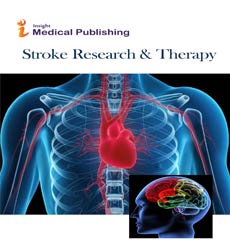The Effects of Stroke on the Body
Greysi Poul
Greysi Poul*
Department of Cardiology, Catholic University of the Sacred Heart, Milan, Italy
- *Corresponding Author:
- Greysi Poul
Department of Cardiology
Catholic University of the Sacred Heart
Milan
Italy
E-mail: poulgreysi@hotmail.com
Received Date: June 04, 2021; Accepted Date: June 18, 2021; Published Date: June 25, 2021
Citation: Poul G (2021) The Effects of Stroke on the Body. J Stroke Res Ther Vol.5 No.3:116.
Description
A stroke is a mind assault. It happens when the blood supply to some portion of our mind is cut off. Blood conveys fundamental supplements and oxygen to our mind. Without blood, our synapses can be harmed or annihilated and they will not have the option to take care of their work. Since our mind controls everything our body does, a stroke will influence the manner in which our body capacities. For instance, if a stroke harms the piece of our mind that controls our right leg, then, at that point we may have shortcoming or deadness in that leg. Our mind additionally controls how we think, learn, feel and impart. A stroke is abrupt and the impacts on our body are prompt.
ADHD shows diversely in every individual who has it. Sleepiness is only one of numerous indications that an individual may insight. The indications can change with time or situation, and an individual may find that they need to change their treatment routine as their manifestations shift. Getting far reaching care from a specialist and an emotional well-being proficient can help. Guardians or parental figures who feel that their youngster may have ADHD should look for an exhaustive workup to preclude different findings. They should then seek after a blend of medicines, including conduct mediations and parental help.
Discourse and language
Issues with discourse and language can make it hard to track down the right words to say, to name protests effectively, or to fathom what others are saying. A few groups additionally may encounter issues in related abilities like math, perusing or composing. This doesn't mean these abilities are lost for eternity. Commonly, with discourse and language treatment, these abilities can be relearned or substitute methods of correspondence are framed.
Gulping
After a stroke nerves which control gulping can be debilitated so food, drink or prescriptions can slide into the lungs as opposed to being gulped typically. In the clinic, the medical caretaker or language teacher will play out a test before we eat, drink or swallow pills to ensure it is ok for us. For certain individuals this might be a brief condition; for other people, it very well may be extreme and lasting.
Memory
Memory, particularly transient memory, can be influenced by a stroke. We will be unable to hold what happened five minutes prior or recover recollections from an earlier time. Strokes can influence verbal memory, for example, naming things on a shopping list, or visual memory, for example, perceiving faces. A stroke can cause issues with reviewing data, however that doesn't mean new abilities can't be acquired and held.
Visio-perceptual abilities
A stroke can influence the capacity to focus on one side of the visual field. Despite the fact that there may not be vision issues, the powerlessness to focus (frequently to one side) may make an individual find divider while strolling or stumble on objects in the way. Here and there this disregard of room can be so extreme patients may reject that a body part even has a place with them or won't utilize one side of the body notwithstanding no real loss of actual capacity, there can likewise be a trouble.
Conclusion
The intrathecal dose and effect profiles of levobupivacaine and bupivacaine have been tried to be determined by a small number of studies. Bremerich investigated the optimum intrathecal dose of hyperbaric levobupivacaine in spinal anesthesia during elective cesarean section; levobupivacaine at 10 and 12.5 mg doses did not find any statistically significant difference in terms of analgesia, sensory and motor block, and they recommended 10 mg levobupivacaine for patients undergoing elective caesarean surgery with spinal anesthesia. Therefore, we used 10 mg of hyperbaric levobupivacaine in our study.
Open Access Journals
- Aquaculture & Veterinary Science
- Chemistry & Chemical Sciences
- Clinical Sciences
- Engineering
- General Science
- Genetics & Molecular Biology
- Health Care & Nursing
- Immunology & Microbiology
- Materials Science
- Mathematics & Physics
- Medical Sciences
- Neurology & Psychiatry
- Oncology & Cancer Science
- Pharmaceutical Sciences
